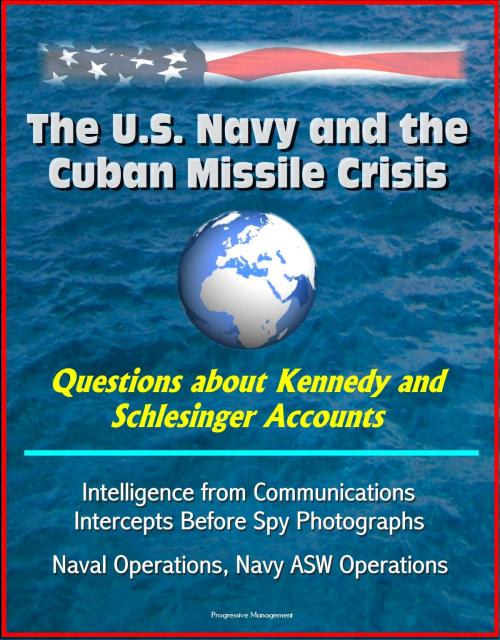The U.S. Navy and the Cuban Missile Crisis: Questions about Kennedy and Schlesinger Accounts, Intelligence from Communications Intercepts Before Spy Photographs, Naval Operations, Navy ASW Operations
Fiction & Literature, Literary Theory & Criticism, Caribbean & West Indian, Nonfiction, History, Military, Naval| Author: | Progressive Management | ISBN: | 9781310769337 |
| Publisher: | Progressive Management | Publication: | January 28, 2016 |
| Imprint: | Smashwords Edition | Language: | English |
| Author: | Progressive Management |
| ISBN: | 9781310769337 |
| Publisher: | Progressive Management |
| Publication: | January 28, 2016 |
| Imprint: | Smashwords Edition |
| Language: | English |
Professionally converted for accurate flowing-text e-book format reproduction, this study examines the traditional interpretation of the 1962 Cuban Missile Crisis and the Navy's quarantine of the island. A bevy of political scientists, and even a few historians, have compiled an impressive literature on the Cuban Missile Crisis, but most accounts draw heavily on the memoirs of former Kennedy insiders, especially Robert Kennedy and Arthur Schlesinger, Jr. Based on recently declassified records and interviews with participants, this study corrects some of the misinterpretation of naval operations, reveals new evidence about U.S. intelligence, and throws into doubt the Kennedy/Schlesinger account.
Based on intelligence gleaned from communications intercepts, Kennedy was alerted in early July to Soviet Premier Khrushchev's plan to deploy ballistic missiles in Cuba. This intelligence was confirmed by the subsequent Soviet sealift effort, communications intercepts, and CIA agents on the island. Yet, Kennedy did little to prepare his administration to deal with the dilemma. He moved forcefully to restrict intelligence on the buildup, but did nothing to prevent it.
Kennedy moved only in mid-October when he had irrefutable photographs of the missiles. He imposed a limited naval blockade around Cuba and coerced the Soviets to remove the missiles through frantic back-door diplomacy. This included a trade for American Jupiter missiles in Turkey.
This study considers several issues related to the development of intelligence before and during the crisis, command and control of naval operations, and the Navy's ASW operations.
The initial American reaction to Castro's surprising victory was mixed. Many Americans, including Senator John Kennedy, a Massachusetts Democrat, viewed Castro in the same light as did most Cubans, a liberator who had thrown off the shackles of an oppressive dictator. When the fatigue-clad revolutionary visited New York in April 1959, he was greeted by mobs shouting "Viva Castro," and he soothed Wall Street's fears by denying that he was a communist and declaring his respect for private property. Not everyone saw Castro as a nuevo amigo, however. After meeting with the Cuban leader, Vice President Nixon told Eisenhower that Castro "was either incredibly naive about Communism or under Communist discipline and that we would have to treat and deal with him accordingly." Nixon's assessment was correct. Castro had no intention of becoming an American puppet, and he gradually moved Cuba into Russia's orbit.
Professionally converted for accurate flowing-text e-book format reproduction, this study examines the traditional interpretation of the 1962 Cuban Missile Crisis and the Navy's quarantine of the island. A bevy of political scientists, and even a few historians, have compiled an impressive literature on the Cuban Missile Crisis, but most accounts draw heavily on the memoirs of former Kennedy insiders, especially Robert Kennedy and Arthur Schlesinger, Jr. Based on recently declassified records and interviews with participants, this study corrects some of the misinterpretation of naval operations, reveals new evidence about U.S. intelligence, and throws into doubt the Kennedy/Schlesinger account.
Based on intelligence gleaned from communications intercepts, Kennedy was alerted in early July to Soviet Premier Khrushchev's plan to deploy ballistic missiles in Cuba. This intelligence was confirmed by the subsequent Soviet sealift effort, communications intercepts, and CIA agents on the island. Yet, Kennedy did little to prepare his administration to deal with the dilemma. He moved forcefully to restrict intelligence on the buildup, but did nothing to prevent it.
Kennedy moved only in mid-October when he had irrefutable photographs of the missiles. He imposed a limited naval blockade around Cuba and coerced the Soviets to remove the missiles through frantic back-door diplomacy. This included a trade for American Jupiter missiles in Turkey.
This study considers several issues related to the development of intelligence before and during the crisis, command and control of naval operations, and the Navy's ASW operations.
The initial American reaction to Castro's surprising victory was mixed. Many Americans, including Senator John Kennedy, a Massachusetts Democrat, viewed Castro in the same light as did most Cubans, a liberator who had thrown off the shackles of an oppressive dictator. When the fatigue-clad revolutionary visited New York in April 1959, he was greeted by mobs shouting "Viva Castro," and he soothed Wall Street's fears by denying that he was a communist and declaring his respect for private property. Not everyone saw Castro as a nuevo amigo, however. After meeting with the Cuban leader, Vice President Nixon told Eisenhower that Castro "was either incredibly naive about Communism or under Communist discipline and that we would have to treat and deal with him accordingly." Nixon's assessment was correct. Castro had no intention of becoming an American puppet, and he gradually moved Cuba into Russia's orbit.















